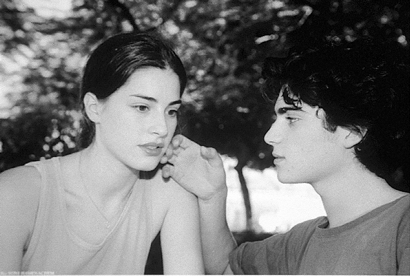By GARY M. KRAMER
Oshri Cohen shines in an Israeli comedy long on quirky characters, shorter on narrative sparkle
The likeable Israeli film “Bonjour Monsieur Shlomi” features an adorable title character (Oshri Cohen) who himself wants desperately to be liked. In the opening scene, he asks his girlfriend Tehila (Rotem Nissmo) “Do you love me?” only to be rebuffed by her response, which is to freeze things between them.
Shlomi’s home life is no more satisfying. He cares for his kindly, wheelchair-bound grandfather (Arieh Elias) and does all of the family cooking. His mother (Esti Zakheim) is exhausted from working, and exasperated by her cheating husband, whom she speaks ill of at every opportunity. His sister (Rotem Abuhab) has marital troubles of her own, and she is always bursting in the door and into tears. And then there is Shlomi’s sexy—and sex-crazed—older brother, (Assi Cohen) who taunts his sibling, and is not above starting a dick-measuring competition at the dinner table to belittle his brother.
What is more, Shlomi lusts after Rona (Aya Stainovitz) his comely next-door neighbor who already has the attention of both Shlomi’s brother and another guy.
If all of this sounds like a big screen sitcom, it is, but the familiarity of an awkward teenager struggling to overcome an oppressive family is still quite charming. In fact, “Bonjour Monsieur Shlomi,” has several parallels to TV’s “Malcolm in the Middle”—not the least of which is that Shlomi himself is a genius, unappreciated, and unable to get the intellectual fulfillment he needs.
“Bonjour Monsieur Shlomi,” plays out that classic underachiever tale, in this case with Shlomi’s poor performance in school but reliability at home stemming in part from his need to be normal, to be liked. When a school headmaster (Yigal Naor) takes an interest in Shlomi, and hopes to help him realize his true potential, Shlomi thinks he is in trouble and reacts by questioning the special attention.
While director Shemi Zarhin peoples his film with interesting characters, and offers insights about the various familial relationships, the thinness of the material at times becomes transparent. A subplot involving Shlomi’s parents comes off as one-dimensional. Shlomi’s estranged father (Albert Iluz) pops up from time to time to try to reconcile with the family, his appearance mostly serving only to give his estranged wife another opportunity to rant against him. These scenes have neither the comic nor the dramatic impact they could, which may be a result of the film being big on characters and small on plot. When Shlomi’s parents are made aware of their son’s smarts, their reactions are equally broad and unfunny.
And while Shlomi’s hunky brother provides sufficient comic relief (and eye candy), Abuhab as his sister is largely wasted in her one-note role. The most interesting thing about Shlomi’s siblings happened before the film begins—his brother needed a kidney, and his mother donated hers.
Girlfriend Tehila, following her opening scene rebuff of Shlomi, is pretty much ignored as neighbor Rona figures into the story. The scenes between Shlomi and Rona, however, are tender, and in a moment of remarkable honesty, Shlomi intelligently decides how to grapple with his dream girl and his own virginity. American movies and sitcoms should take note.
Still, the relationship between Shlomi and Rona is not the most loving or moving in the film. The exchanges Shlomi has with his grandfather—including the simple gesture of appreciation that became the film’s title—are so poignant that they may jerk tears by the film’s end, and these scenes certainly redeems the film’s more superficial elements.
“Bonjour Monsieur Shlomi,” is carried along by Oshri Cohen’s wonderfully low-key performance. He makes Shlomi sympathetic, even lovable. Cohen has a magnetic screen presence and a genuine rapport with his co-stars. The film may be flawed, like the family it portrays, but it is also winning, like its hero.
Read More: https://www.amny.com/news/compelling-one-woman-show/
































